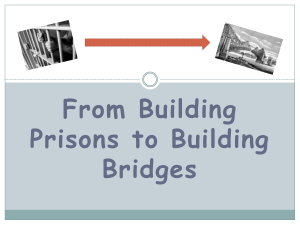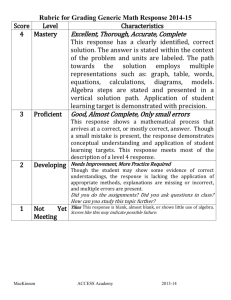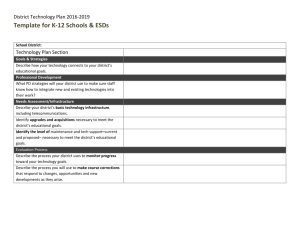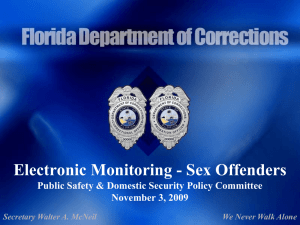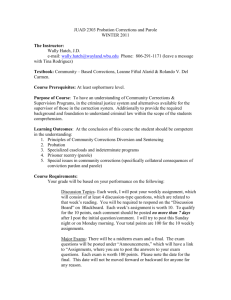Rules and Regulations for the Denver Community Corrections Board
advertisement
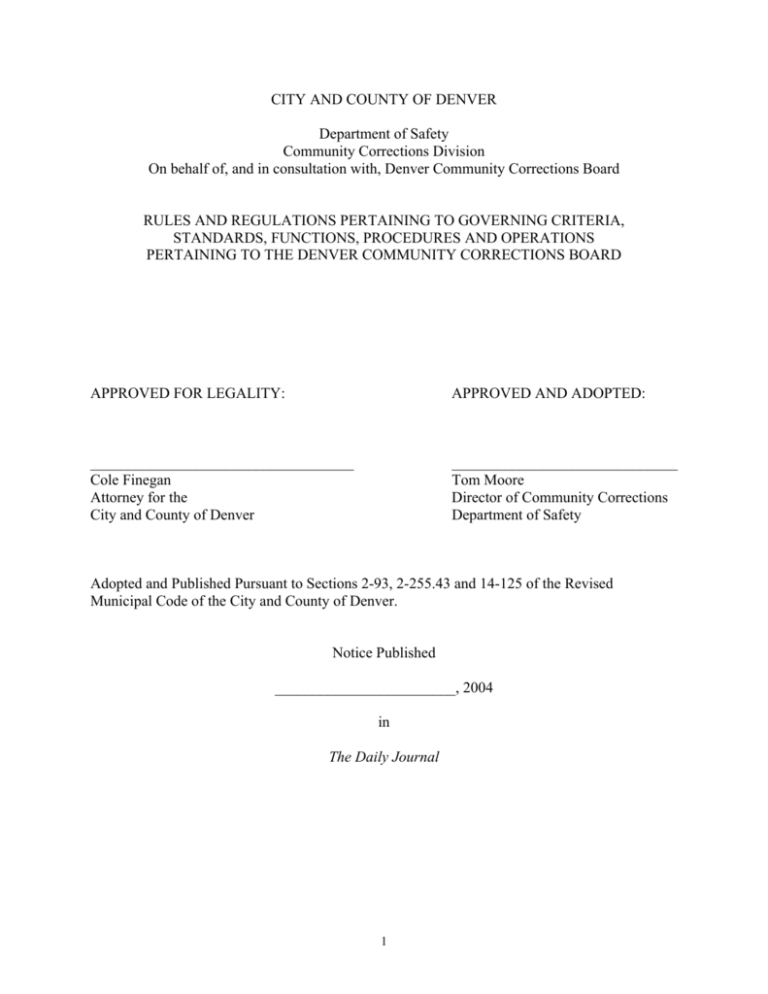
CITY AND COUNTY OF DENVER Department of Safety Community Corrections Division On behalf of, and in consultation with, Denver Community Corrections Board RULES AND REGULATIONS PERTAINING TO GOVERNING CRITERIA, STANDARDS, FUNCTIONS, PROCEDURES AND OPERATIONS PERTAINING TO THE DENVER COMMUNITY CORRECTIONS BOARD APPROVED FOR LEGALITY: APPROVED AND ADOPTED: ___________________________________ Cole Finegan Attorney for the City and County of Denver ______________________________ Tom Moore Director of Community Corrections Department of Safety Adopted and Published Pursuant to Sections 2-93, 2-255.43 and 14-125 of the Revised Municipal Code of the City and County of Denver. Notice Published ________________________, 2004 in The Daily Journal 1 Rules and Regulations Governing Criteria, Standards, Functions, Procedures and Operations Pertaining to the Denver Community Corrections Board I. These Rules and Regulations are adopted and issued by the Manager of Safety of the City and County of Denver, through his Designee, the Director of Community Corrections, with the advisory cooperation of the Denver Community Corrections Board in accordance with the authority contained in Chapters 2 and 14 of the Revised Municipal Code of the City and County of Denver. II. As used in these Rules and Regulations, the following terms or phrases shall have the following meanings: 1) Bylaw shall mean such bylaws and other internal operating rules, not affecting the public at large, that may be promulgated from time to time by the members of the Board, and utilized for the determination of quorums, conduct of business, and other internal procedural matters and related activity by the Board. All such Bylaws shall be subject to the approval of the Manager of Safety or his or her Designee, and shall be consistent with Colorado law and the Charter, Ordinances, Executive Orders, and Regulations of the City, including these rules and regulations. 2) Chairperson shall mean the member of the Board selected to act in that capacity by the other members of the Board. 3) City shall mean the City and County of Denver, a Colorado municipal corporation. 4) Code of Penal Discipline- ("COPD") shall mean the body of regulations governing the behavior of an inmate sentenced to the DOC. The COPD has authority over the Transition and ISP Inmate populations in community corrections programs, but not parolees. 5) Colorado Department of Corrections ("DOC") shall mean the governmental agency with statutory responsibility for the Transition and ISP Inmate populations within community corrections programs. 6) Day shall mean calendar day unless otherwise indicated. 7) Denver Community Corrections Board (“Board”) shall mean the body established by the City pursuant to Division 9 of Article VIII of Chapter 2, D.R.M.C., as amended, under the authority granted by CRS §17-27-103 et. seq., as amended. 2 8) Denver Community Corrections Program (“Program”) shall have a meaning consistent with the definition set out at CRS §17-27-102 (3), as amended, and shall in addition mean those community corrections programs and operations carried on by employees of the City, or by independent contractors under contract to the City, under the direction and coordination of the Community Corrections Division of the Department of Safety. 9) Designee shall mean the person authorized by the Manager of Safety to provide liaison and other communication with the Board as set out in these Rules and Regulations. Unless otherwise designated by the Manager of Safety, the Designee for these purposes shall be the Director. 10) Director shall mean the Director of the Community Corrections Division of the Denver Department of Safety 11) Diversion shall mean the status of an Offender placed in a community corrections program from a district court of the State of Colorado either as a condition of probation or as a direct sentence to community corrections. While in a community corrections program such an Offender remains under the jurisdiction of the sentencing district court through the probation department of such court. 12) Division of Youth Corrections ("DYC") shall mean the agency operating under the Colorado Department of Human Services responsible for the oversight of juvenile offenders in institutions and on parole. 13) Facility shall mean a community correctional facility, whether Residential or Non-residential, operated pursuant to the Program. 14) ISP Inmate shall mean a DOC inmate serving a portion of his or her DOC prison sentence in the community at a private residence and therefore participating in a form of Non-Residential community corrections. This population is supervised by the DOC and must adhere to the COPD. 15) Manager shall mean the Manager of Safety or his or her Designee, as applicable. 16) Non-Residential shall mean that portion of a community corrections sentence under the Program in which an Offender is supervised by Facility staff, follows Facility rules, and maintains employment, but lives in his or her own residence. This portion of the sentence usually follows a period of Residential placement. 17) Offender shall have the meaning set out at CRS §17-27-102 (6), as amended, and shall in addition mean any other person lawfully seeking or obtaining placement in a Facility operated pursuant to the Program, pursuant to the discretion and authority of the Board and the Manager. 3 18) Parolee shall mean a person under commitment to DOC who has been paroled by the Colorado State Parole Board. 19) Remediation shall mean the component of the Program in which an Offender is transferred to a more secure internal phase of the Program for a period of time. 20) Residential shall mean that portion of a community corrections sentence under the Program that requires the Offender to live within a Facility while receiving round the clock supervision. 21) Screening Committee (“SC”) shall mean the committee appointed by the Board to screen specific cases for acceptance into the Program. 22) Second (2nd ) Judicial District Probation Department shall mean the referring agency with statutory responsibility for Diversion Offenders in the Program referred from the Second (2nd) Judicial District.. 23) Transition shall refer to the status of an Offender who is a DOC inmate, including an ISP Inmate, in a community corrections program, including the Program, who undertakes a transitional movement from a Department of Corrections prison to a community corrections facility, including a Facility, prior to their release to parole. While in a community corrections program the Offender remains under the jurisdiction of the DOC and must abide by the COPD. III. Establishment and Purpose: 1) Pursuant to the enabling authority granted in CRS §17-27-103, as amended, the City has created the Board by the enactment of Ordinance 509, Series of 2000 and further defined its scope by enactment of Ordinance 481, Series of 2003. 2) The Board shall have the following purposes: a. To advise the City on issues relating to the creation or operation of community corrections facilities or programs. b. Consistent with the provisions of CRS §17-27-103, as amended, to function as an advisory board to the Manager in matters relating to Denver’s participation in the State of Colorado community corrections program and related matters. c. In consultation with and under the general oversight and direction of the Manager, to act as a functional board, consistent with the provisions of CRS §17-27-101 et seq., as amended, in the determination as to the acceptance or rejection of Offenders reviewed for placement into the Program and in the establishment of acceptance criteria and screening procedures therefore, consistent with applicable law. 4 IV. V. Powers and Duties of the Board: 1) The Board shall perform as the official community corrections board for the City. It will review matters relating to community corrections generally and to the Program, as requested by the Manager, advise the Mayor and the Manager on actions taken to accomplish the mandated responsibility of the Board and act in conjunction with the Manager to ensure the protection of the community, to safeguard the rights of Denver residents, and to provide for the needs of the Offenders who will be supervised under the Program. 2) The Board shall, in consultation with the Manager, establish and enforce standards, policies, acceptance criteria, and screening procedures to govern the Board’s function in the acceptance or rejection of Offenders into the Program. Such standards, policies, acceptance criteria, and procedures shall be consistent with the provisions of Colorado law, and the Charter, Ordinances, Executive Orders and Regulations of the City, including these Rules and Regulations. 3) The Board shall establish a process and review those Offenders referred for placement in the Program operating within the boundaries of the City, by the DOC and the sentencing courts of the State of Colorado, and by the DYC. 4) The Board shall provide input to the Manager by identifying needs, recommending goals and objectives and advising on resource utilization, and monitoring the operations of the Program. 5) As specifically requested by the Manager, the Board shall act as an information source for the City and may act, as requested by the Manager, in a liaison capacity with other governmental entities and public and private organizations. Membership of the Board: The Board shall consist of twenty-one (21) members who shall be appointed by the Mayor and whose appointment shall be confirmed by ordinance. The Board shall be comprised as set out in D.R.M.C. 2-255.41, as amended. VI. Meetings: 1) The Board shall meet as needed to perform its functions through general or special meetings, including meetings of the SC. In consultation with the Manager, it is the prerogative of the Board Chairperson to call special meetings, including SC meetings, as required to perform the duties of the Board in a timely and efficient manner. Bylaws may be promulgated by the Board respecting the conduct of meetings. All references in this Article V to Chairperson shall be deemed to include Vice-Chairperson or Acting Chairperson, as may be established by Bylaw, as applicable. 5 VII. 2) The time and place of each regular meeting of the Board shall be communicated to Board members at least four (4) calendar days prior to each such regular meeting. The time and place of each special meeting of the Board shall be communicated to Board members at least forty-eight (48) hours prior to each such special meeting. 3) All regularly scheduled meetings of the Board shall be open to the public and shall comply with the Colorado Open Meetings Law, as amended, and any promulgated Bylaws. During the course of such regularly scheduled meetings, the Board may go into executive sessions and close the meeting to the public, to discuss any matter deemed inappropriate for public review pursuant to the provisions for executive session set out in the Colorado Open Meetings Law, as amended. 4) The Chairperson of the Board may call special training or work sessions of the Board. Board decisions affecting the well-being of the public shall not be formalized in such sections but accomplished in the Board’s regularly public meetings. In all matters relating to public meetings, the Board shall comply with the Colorado Open Meetings Law, as amended. 5) Quorums, conduct of business, and other internal procedural matters may be otherwise established by the Board through Bylaws. Such Bylaws shall be consistent with Colorado law and the Charter, Ordinances, and Regulations of the City, including these Rules and Regulations. To the extent not inconsistent with Colorado law and the Charter, Ordinances, Regulations, and Executive Orders and Bylaws of the City, the provisions of Roberts Rules of Order may also be utilized. 6) The conduct of the business of the Board meetings shall be pursuant to a formal agenda to be distributed with the meeting announcement. Requests for items to be placed on the agenda shall be directed to the Chairperson or Director at least ten (10) days prior to a regularly scheduled meeting. The agenda may be changed at the discretion of the Chairperson or by a majority vote of the declared quorum. All conduct of the business of the Board shall be in compliance with the Colorado Open Meetings Law, as amended. 7) There shall be minutes taken of all regular meetings of the Board and such minutes shall be approved by the Board at its next regular meeting. Copies of the minutes shall be forwarded to Board members prior to the next scheduled meeting. All provision of transcribing and retention of records shall be subject to the provisions of the Colorado Open Meetings Law, as amended. Staff Support to the Board 6 Staff support to the Board will be provided from the resources of the Denver Department of Safety, Division of Community Corrections. As deemed necessary by the Manager in his or her sole discretion, the assistance and input and personnel from the DOC, 2nd Judicial District Probation Department, and DYC may also be sought. VIII. Offender Processing and Control: 1) Offenders placed into the Program will remain under the authority and control of the agency of government legally responsible for the supervision of the Offender. 2) Offenders placed by the sentencing courts of Colorado, DOC or DYC remain under the general authority and custody of those agencies. 3) Specific Offender supervision and treatment will be provided by the community correction providers operating in the Program, with the agreement and approval of the agencies with legal authority over the Offender following placement approval of the Offender by the Board. 4) All Offenders referred for potential placement into the Program must meet the criteria of acceptability established by the Board. These criteria will be determined by the Board, subject to the consultation and approval by the Manager, and communicated to the Second (2nd) Judicial District, the DOC, and the DYC. IX. Criteria and Procedure for Assessment of Proposed Placement of Offenders in Community Corrections Facilities: A. When sentenced or assigned by a Court of the State of Colorado, or recommended for placement in the Program by the DOC or DYC, Offenders shall be accepted into the Program without further action by the Board, with the following exceptions (in the following mentioned convictions, criminal attempt and conspiracy to commit said crime shall be included): 1) Persons charged with felony offense(s) who have not yet entered a plea, or, who have entered a “not guilty” plea and await trial or other judicial proceedings, (except those persons who have formally agreed to the terms of “deferred” prosecutions and/or judgment will be eligible.) 2) Proposed Diversion placements adjudicated in a Court other than the Second Judicial District Court. 3) Persons referred directly to a Non-residential community corrections program without first being placed in a Residential program. 4) Persons currently or previously convicted of any felony offense involving the use, possession, or threatened use of a deadly weapon within five (5) years of the most recent conviction. 7 5) Persons currently or previously convicted of any criminal offense, the underlying factual basis of which involved a sex –related criminal offense. 6) Persons currently or previously convicted of a felony involving child abuse. 7) Persons currently or previously convicted of arson or a felony involving burning. 8) Persons currently or previously convicted of sale, dispensing or possession for sale, manufacturing of narcotics/dangerous drugs. . Persons currently or previously convicted of any acts instrumental in causing serious bodily injury or death, or any present felony offense involving domestic violence or intimidation of a witness. 9) 10) Persons assigned to Community Corrections by the Court, after having previously absconded/escaped from a community corrections Facility or any community corrections program within the preceding year. 11) Persons previously convicted of a felony involving escape from a correctional institution or correctional program within five (5) years. 12) Persons who have parole revoked within the preceding five (5) years for the commission of a new crime, excluding all misdemeanors and city ordinance violations involving property crimes. There shall be no time limitation for parolees revoked for the commission of a new crime involving violent behavior or the use of a weapon. 13) Persons convicted of a felony while on escape status, while on parole, or under correctional supervision (excluding probation supervision) within the preceding five (5) years. 14) Persons whose criminal history, correctional performance or treatment diagnosis demonstrate a history of violent behavior. B. Exceptions to Above Criteria: 1) All individuals ineligible for placement into the Program according to the criteria stated above may be accepted for placement for good cause through formal action of the Board. 2) Placement of Offenders not meeting the criteria will be determined by formal action of the Board at the regularly scheduled meetings. Agencies requesting placement policy exception will be required to notify the Board to schedule a case for review, and be prepared to provide information on the proposed placement Offender’s personal and criminal history, or any additional information required by the Board. 8 X. Procedure for Presentation of Offender Applications for Placement to the Board: Offenders who fall within one of the exceptions to automatic acceptance defined in IX. A. 1) through 14) above must be presented to the Board for possible placement in the Program. This shall be done as follows: 1) XI. TRANSITION: Eligibility for placement is outlined in CRS §18-1.3-301. All referrals are initiated and processed by the DOC Division of Adult Parole and Community Corrections. a. Cases that violate Board acceptance criteria 1,2,3,4,5,6,7,9,10 set out in Section IX.A. above are referred to the full Board. In addition any case that would require victim notification is referred to the Board. b. Cases that violate Board acceptance criteria 8,11,12,13,14 set out in Section IX.A. above will be referred to the SC. This only applies to Transition and Parole placements. c. A request from an SC member to defer a case to the full Board shall be approved by the SC Chair. 2) All DOC referrals which require victim notification or for which a victim appears at the meeting of the SC will be deferred to the full Board for placement review. 3) Any DOC Transition Offender rejected by the Board cannot be referred again to the Program for six (6) months. The DOC also processes ISP Inmate and Parolee cases. 4) DIVERSION: Eligibility for placement is outlined in CRS §18-1.3-301. All referrals are processed by the Denver Adult Probation Department Community Corrections Liaison. All Diversion Offenders in the Program must remain in a Residential setting for a minimum of six (6) months prior to transfer to a Nonresidential status for the remainder of their sentence, unless an exception is approved by the Board. The maximum an Offender may remain in a Residential component of the Program is twelve (12) months, unless an extension is approved by the Board. 5) JUVENILE: Eligibility is outlined in CRS §19-2-210. All referrals are processed by the DYC. 6) All written statements from either the defense or prosecution, must be submitted to the Board through the Director no later than ten (10) days prior to the Board meeting at which the case will be reviewed. Victim Issues 9 If a victim attends a Board meeting, and the victim chooses to make a statement, oral or written, he/she will be allowed five (5) minutes for their oral statement. It shall remain the responsibility of the referring agency to inform victims of the date and time of the Board meeting. XII. Offender Termination from Program: 1) Participation in the Program will be at the discretion of the placing agency, the Program or the Board, pursuant to CRS §17-27-103, as amended. 2) If any Offender is rejected after acceptance and not remediated within the Program, such Offender is automatically rejected by the Board. 3) If an Offender escapes while on Residential status or absconds while on Nonresidential status from a Facility, such action will constitute a waiver of the Offender’s right to notice of an administrative review process. 4) The Chief Probation Officer of the 2nd Judicial District Adult Probation Department and active Board member is hereby designated by the Board, acting under authority of CRS §17-27-103, as amended, to review program decisions terminating a Diversion Offender’s placement (“reject after acceptance “) in the Program. 10
